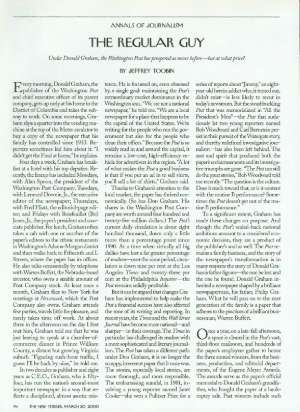The New Yorker, March 20, 2000 P. 94
ANNALS OF JOURNALISM about Donald Graham and his Washington Post... Graham, who is fifty-four, has run the nation’s second-most important newspaper in a way that reflects a disciplined, almost ascetic existence. He is focussed on, even obsessed by, a single goal: maintaining the Post’s extraordinary market dominance in the Washington area. “We are not a national newspaper,” he told me. “We are a local newspaper for a place that happens to be the capital of the United States...” Because the Post is so widely read in and around the capital, it remains a low-cost, high-efficiency vehicle for advertisers in the region... The Post’s current daily circulation is about eight hundred thousand, down only a little more than a percentage point since 1990. At a time when virtually all big dailies have lost a far greater percentage of readers—over the same period, circulation is down nine per cent at the Los Angeles Times and twenty-three per cent at the Philadelphia Inquirer—the Post remains solidly profitable. But it can be argued that changes Graham has implemented to help make the Post a financial success have also affected the tone of its writing and reporting. Tells about his family... In the early seventies he was a cop in Washington... Describes his father's suicide... Mentions that one of the critical turning points for the company was getting investor Warren Buffet involved as a member of the board... Graham’s career as publisher of the Post can rightly be seen as an exercise in moat building... According to a recent survey, the Post reaches forty-six per cent of households in the Washington metropolitan area on weekdays and sixty-one per cent on Sundays. In the newspaper business, this is called “penetration,” and no major paper in the country can compare with the Post in this regard. Graham clearly takes the Post’s financial success as a validation of its editorial direction, and he has consistently promoted its new leadership from within. With the Star long gone as a competitor, and the Times regarded as serving a different market, the Post often behaves as if it had all the time in the world. Bob Woodward, who still writes for the paper now and then and runs the newsroom on occasional weekends, says, “It’s not as alive as it used to be.” Graham has little interest in frivolity. The publisher’s favorite kind of journalism is one that, like his approach to business, reflects his decent, steady personality. In recent years, the Post has suffered a considerable brain drain, which has included such writers as Rick Atkinson, Blaine Harden, Eric Lipton, Gustav Niebuhr, Eleanor Randolph, Benjamin Weiser, Pierre Thomas, and Laurie Goodstein, several of them lost to poaching from the Times. There has been one significant exception to the Post’s customary caution: the Internet. Though the company does not separately declare the results of its Internet division, last year’s annual report suggests that in 1998 it lost about sixty-seven million dollars on these operations. Post Company stock has dropped by about eighteen per cent in recent months, at least in part because of the prospect of even more short-term losses on the Internet. Graham was recently treated for prostate cancer...As of now, Katharine Weymouth Scully, Don’s niece and Kay Graham’s oldest grandchild, is the only member of the next generation to work at the Post, and many people both inside and outside the family have great hopes for her...


